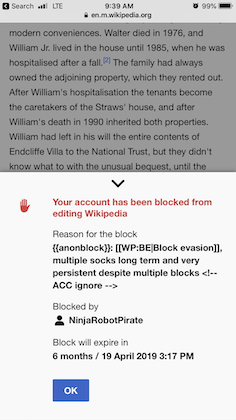Git Forensics
Earlier today I was helping a coworker with a question about data related to block messages on mobile, like this:
Lol.
— Katherine Maher, October 20, 2018
I did not anticipate my investigation to become what I might best describe as “git forensics”. First, let’s introduce our dramatis personae:
- MobileFrontend
- When you browse the mobile (“m.” subdomain) version of Wikipedia in a browser, what you see rendered is largely due to the MobileFrontend extension for MediaWiki (the software that powers Wikipedia, Wikimedia Commons, and Wikimedia projects).
- Git
- Git is a free and open source system for version control.
- Phabricator
- Phabricator is an open source toolkit for code review, repository hosting, bug tracking, and project management. If you’re familiar with Jira it’s kind of like that.
The story begins with the Phabricator task T260218 to “Add logging for measuring impact of our work on improving the mobile block messages.” The task mentions that this has been done in the past and links to a task from August 2018: T201719. What happened to that tracking? Is that data still available?
